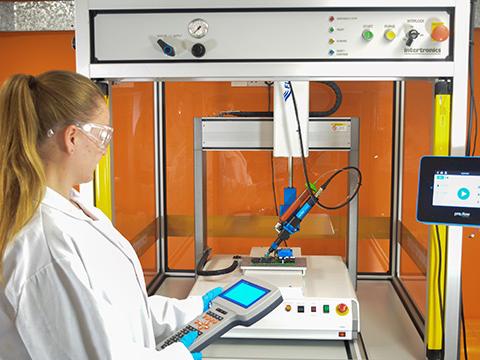
Posted to News on 9th May 2023, 10:30
Learning and development in the adhesives industry

Kevin Brownsill, head of technical: learning and development at adhesives and dispensing equipment supplier Intertronics, discusses the importance of training.
Though it may seem initially like a simple task, adhesive bonding may be a vital and challenging part of your product design. Every application is different, and establishing what works best involves detailed discussions and testing. For design engineers without specialist adhesives experience, participating in dedicated training can help set a project up for success. This gives them a foundation of knowledge that can help them progress a project with their adhesives partner more smoothly.
With a shortage of UK engineers, and around 20% of the workforce due to retire by 2026 according to the Engineering and Construction Industry Trade Body, training and upskilling is on the minds of many British manufacturing leaders. In addition, as the boundaries between traditional engineering fields like mechanical engineering and electrical engineering are beginning to blur, engineers may take on more multidisciplinary roles. Training in areas outside of an engineer’s core competencies can help project teams progress faster when they are faced with new challenges.
Adhesives and dispensing training
Selecting an appropriate adhesive is key to the success of a design project – it will help the product pass testing and ensure that the bond lasts the lifetime of the product. Alongside material choice, designing a suitable bonding process with simplicity and robustness is critical to the productivity of the manufacturing process.
Selecting adhesives, dispensing and curing equipment is difficult to get right using desk research alone; what works in practice doesn’t always work in theory – the data sheet may not always give the same insights as practical observations and tests. However, many design engineers have not had dedicated training or experience working with adhesives and processing equipment.
Increasing the opportunities for learning and development around adhesives and dispensing will help design projects in British manufacturing businesses run more smoothly. It will help engineers understand at what point to contact their adhesives partner, and what questions to ask to help the project progress smoothly. So, what areas are most important to prioritise training in?
Adhesives, dispensing and curing equipment
Specifying a structural adhesive is both an art and a science. There are an increasing number of structural adhesives on the market, so it can be difficult to keep up with industry advances and choose the best materials to evaluate. There are various factors to consider that influence the decision, and these may differ depending on the priorities of an individual application. A good starting point for engineers is to know what questions to ask when specifying an adhesive, as well as to invest time in training on the different types of adhesive chemistries and their advantages.
Developing a robust, consistent, and validatable adhesives process depends on choosing appropriate dispensing and curing methodology. There are always choices, from manual to semi-automated and automated, with varying levels of speed, accuracy and repeatability. Training is available that covers the variables to consider when specifying application equipment, as well as provide an understanding of the advantages and limitations of available dispensing and curing options.
One particularly important area is productivity, so manufacturing teams may wish to arrange sessions that highlight the particular areas of a process that could be improved. It is difficult to change materials once a process is up and running, so training may cover handling, dispensing, and automation in detail. For example, there is a common misconception that automating a process requires a complete overhaul. We’d like to educate the market that you can incrementally improve a process from manual to automated or semi-automated in a way that is manageable and delivers return on investment.
As the shortage of engineering talent continues to affect British manufacturers, specialist training is a useful tool to bridge knowledge gaps in specialised areas.
Intertronics has always recognised the role training plays in helping its customers establish successful processes. To share the knowledge and insight gained from more than 30 years in the industry, and from work with thousands of UK SMEs, Intertronics is now offering a broader number of seminars, webinars, and 1-2-1 training. These can be delivered online or in person at a customer’s site or at our Technology Centre near Oxford.





